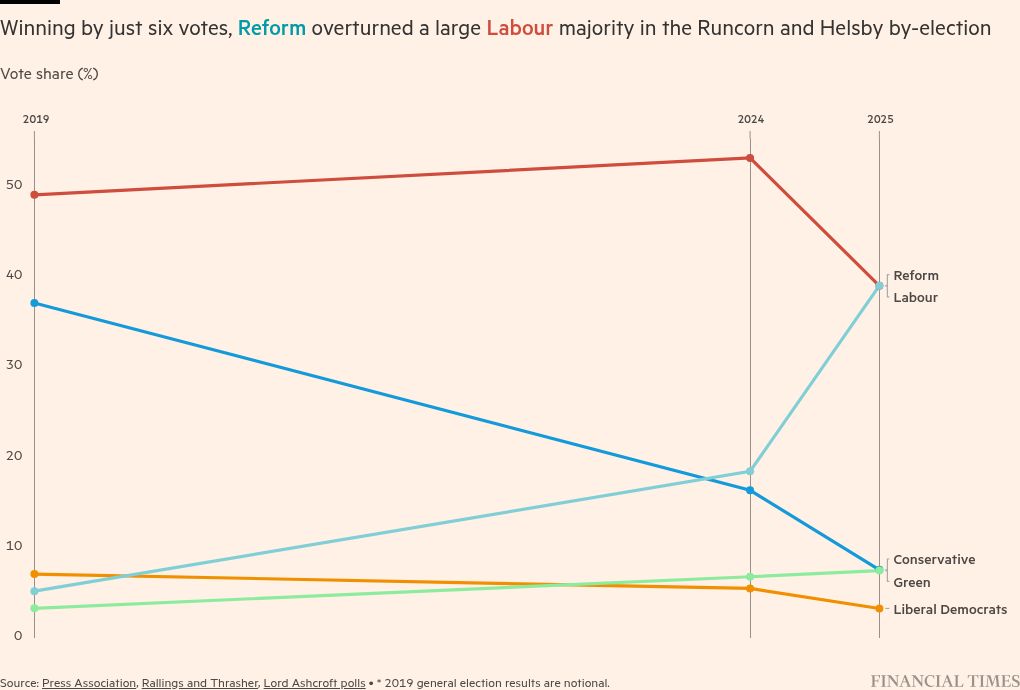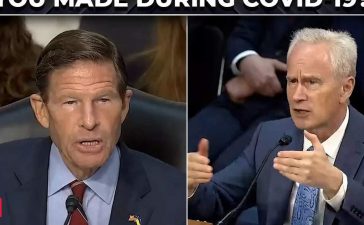Unlock the Editor’s Digest for free
Roula Khalaf, Editor of the FT, selects her favourite stories in this weekly newsletter.
Reform UK leader Nigel Farage on Friday claimed he now leads Britain’s main opposition to Sir Keir Starmer’s government as his party won control of local councils across England and ousted Labour by just six votes in the Runcorn & Helsby by-election.
Farage’s rightwing populist party made big gains against Labour and the Conservatives in the first major test of public opinion since last year’s general election.
Reform secured control of local authorities in Staffordshire, Lancashire, Derbyshire, Nottinghamshire, Lincolnshire, Kent and Durham after taking seats from both Labour and the Tories.
During Friday, the Liberal Democrats made significant inroads into core Conservative territory, gaining more than 90 councillors, including the last five Tory seats in Tunbridge Wells, Kent.
Reform also seized its first mayoralty overnight, in Greater Lincolnshire, as former Tory MP Dame Andrea Jenkyns pushed her old party into a distant second place.
Sarah Pochin won the Runcorn and Helsby seat after a recount, overturning a Labour majority of almost 15,000 to become Reform’s fifth member of parliament, capping a night of extraordinary advances by Farage’s party.
Starmer on Friday accepted the results were disappointing for Labour, saying: “I get it.”
But he refused to back down on unpopular policies that include cutting winter fuel payments and benefit payments, telling the BBC: “The message I take is we need to go further and we need to go faster on the change that people want to see.”
When asked whether Reform was now Labour’s main opposition, Starmer highlighted instead the differences between Labour and Farage’s party on the NHS. Farage has talked about an insurance system that could see some people pay into the health service.
The by-election in a traditional Labour stronghold in England’s north-west was the most significant contest among dozens of mayoral races and council elections that took place on Thursday.
There was a turnout of 46 per cent in Runcorn, compared with 59 per cent at the general election nine months ago.
Farage said that Labour’s vote in its heartland had “collapsed and much of it has come to us”, but admitted that Reform would now come under much greater scrutiny, not least as it starts to run local services in some areas.
“This is a whole different politics,” he said, adding: “I think we’ve supplanted the Conservative party now as the main opposition party of the Labour government.”
The defeat in Runcorn will alarm Labour, which has endured a plunge in its popularity since returning to government in a landslide victory last July.
Conservative leader Kemi Badenoch, whose party lost more than 450 seats during Friday, said she was “determined to win back the trust of the public”.
Writing on social media site X, she said: “These were always going to be a very difficult set of elections coming off the high of 2021, and our historic defeat last year — and so it’s proving.”
The Runcorn seat was held by former Labour MP Mike Amesbury, whose conviction for assault triggered the by-election.
Reform candidate Pochin campaigned on an anti-immigration ticket that targeted a local asylum hotel and capitalised on local anger about the government’s welfare cuts.
Labour championed the government’s extra funding for the NHS and its package of employment reforms, while it also tried to persuade former Green and Lib Dem supporters to vote tactically against Reform.
Results in mayoral races suggested a big swing towards Reform. Jenkyns surged to victory with 42 per cent of the vote. Reform also came close to toppling Labour in North Tyneside and Doncaster.
In North Tyneside in north-east England, Karen Clark won with 30.2 per cent, just ahead of Reform’s 29.4 per cent. In Doncaster, Labour’s Ros Jones won with 23,805 votes, just ahead of Reform’s Alexander Jones at 23,107.
Ellie Reeves, the Labour party chair, said: “These elections were always going to be a challenge.” She added: “We know people aren’t yet fully feeling the benefit and we are just as impatient for change as the rest of the country.”
Reform is at present ahead in national opinion polls with an average of 26 per cent, compared with Labour’s 24 per cent and the Conservatives’ 21 per cent, according to the Financial Times’ poll of polls.
Labour strategists fear that Reform could capture large parts of its former heartlands in northern England and the Midlands at the next general election, which must take place by 2029.
Meanwhile, the Tories are facing a threat from Reform in the north and east and from the centre-left Lib Dems, who hope for big gains in southern councils.
This set of English councils was last contested when former Tory prime minister Boris Johnson was enjoying heightened popularity thanks to the rollout of vaccines during the Covid-19 pandemic.
Kevin Hollinrake, the Conservatives’ shadow housing secretary, said: “If we lost half our seats, which I think we probably will do, it’s going to be a bad night for us.”










